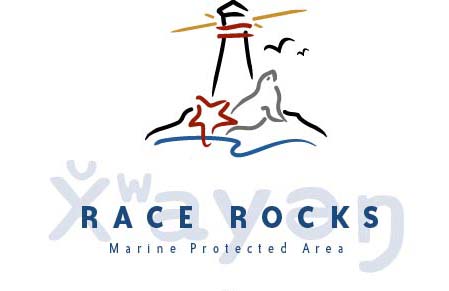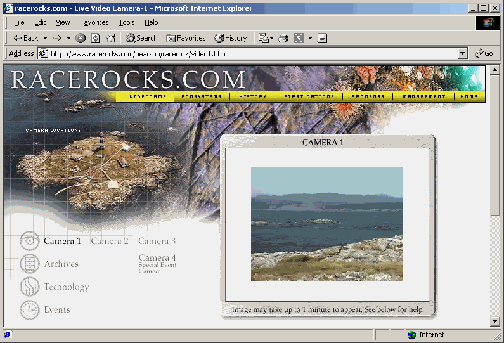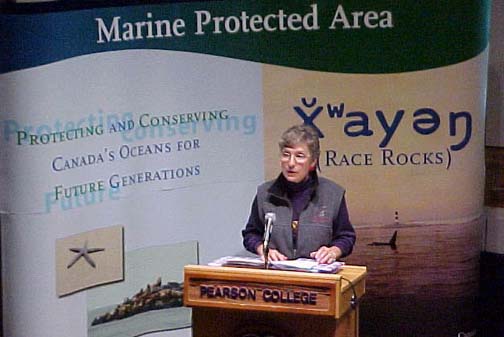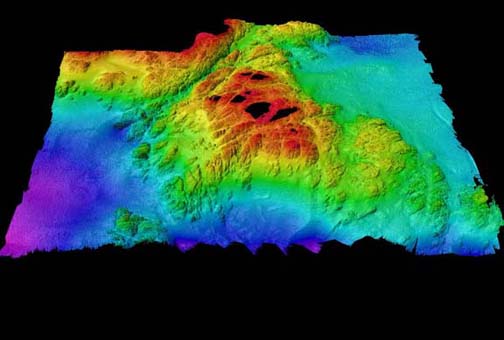Ecological Reserve and Marine Protected Area
OPERATIONAL PROPOSAL 2001/2002
 Presented to: Province of British Columbia
Presented to: Province of British Columbia
BC Parks
Attention:Denis O’Gorman
Assistant Deputy Minister
January 31, 2001
Background
BC Parks was among the first to recognize the extraordinary value of this treasured eco-system. In 1980 the Race Rocks Ecological Reserve was established to protect marine life on the rocky outcrops and the ocean floor extending to a depth of 20 fathoms. Great Race Island, home to the Race Rocks light station was leased to the Federal Government since BC joined confederation. As a result the Island was excluded from the Ecological Reserve.
As a consequence of a Federal decision to de-staff the light station in 1997, the keepers were to be removed and they would no longer provide the essential supervision required for full protection of the Reserve. In excess of $25 million worth of commercially exploitable species are known to exist within the Reserve area. The presence of the keepers was determined to be essential for continued protection. Coast Guard agreed to a special short-term agreement whereby Pearson College would retain the former light keepers as eco-guardians and operate the surplus facilities as a new Marine Education Centre until such time as a permanent solution for the operation of Race Rocks could be found.
BC Parks and the Federal Department of Fisheries and Oceans began community consultations in 1998 to assess the possibility of Race Rocks being recognized as Canada’s first Marine Protected Area. For the first time, Race Rocks, with the cooperation of both levels of government would be truly protected with a management plan that included both the Provincially managed Ecological Reserve and the Federally controlled water column.
On January 24, 2001 Great Race Island (except for a small piece of land which accommodates the navigational aids) reverted back to the Province of British Columbia under the control of BC Parks.
A New Beginning
 A long-term Parks permit is currently being prepared by BC Parks to allow Pearson College to operate the facilities at Race Rocks as a Marine Science and Education Centre in accordance with the new management plan and the original rationale from 1980 when the Race Rocks Ecological Reserve was established.
A long-term Parks permit is currently being prepared by BC Parks to allow Pearson College to operate the facilities at Race Rocks as a Marine Science and Education Centre in accordance with the new management plan and the original rationale from 1980 when the Race Rocks Ecological Reserve was established.
For the first time, the Race Rocks eco-system enjoys full protection under a unified management plan with the authority of both the Provincial and Federal governments. An important new provision has also been made for the full involvement of First Nations in on-going management of the Race Rocks area. The priorities of protecting ecological values, education and research are the primary focus of the recently developed management plan.
Scope of the Race Rocks Project
- The key activities that Pearson College will manage on behalf of BC Parks include:
- Protection
- Continuous supervision of the island and Reserve by resident eco-guardian.
- Security for buildings, equipment and infrastructure (24 hrs/day all year).
- Vigilant observation of activities within the Reserve and if needed, reporting of infractions to appropriate agencies.
- Electronic video monitoring of the Ecological Reserve by enforcement agencies.
- Restrict access to specific areas as necessary.

- Safety
- Observe and report any situations which may represent a safety hazard.
- Assist individuals in distress when required and liaise with rescue agencies.
- Assist in emergency communications.
- Be vigilant for fire hazards.
- Monitor for the occurrence of hazardous material spills.
Science
Continue monitoring program for weather conditions.
- Continue monitoring program for seawater temperature and salinity.
- Ongoing protection of unique Northern Abalone populations and monitoring of population and growth rates.
- Annual intertidal and subtidal transect site monitoring.
- Installation of environmental scan sensor arrays for air, soil and seawater with full accessibility on the Internet.
- Observation and recording of marine mammal and bird populations.
- Daily ecological events log.
- Support for visiting scientists.
- Development of alternative energy solutions.
The Federal Department of Fisheries and Oceans began community
Education
- Development of curriculum materials for K-12 use.
- Cooperative development of information about First Nations focusing on the history of traditional uses and creating a supporting curriculum.
- Operation and continuous upgrading of the racerocks.com education site with a major commitment for the production of online archived video for classroom and public use.
- Interactive web cast production and delivery for use by schools, science centres, museums and conferences.
- Public education programs for visitors to the Race Rocks area.
- Education programs in cooperation with eco-tourism industry and dive community.
Operations
-
- Supervision and monitoring of operating systems including generators, water systems, heating systems and data network.
- Routine preventative maintenance for all buildings, equipment and infrastructure.
- Maintenance of station vessel.
- Assistance to government agencies with equipment installed at Race Rocks.
Eco-guardian / Project Management
 Pearson College is uniquely qualified and suited to operate and manage Race Rocks on behalf of BC Parks and the public.
Pearson College is uniquely qualified and suited to operate and manage Race Rocks on behalf of BC Parks and the public.
Located 3.7 nautical miles from Pearson Collegeâs docks at Pedder Bay, Race Rocks is within easy reach in moderate weather conditions. In addition to the Race Rocks station boat, Pearson College operates two purpose built aluminum workboats suitable for transporting fuel, personnel, equipment and supplies to Race Rocks.Pearson College staff provides all logistical support required for the efficient operation of Race Rocks. Qualified staffing for maintenance, accounting, purchasing and deliveries are all coordinated by existing College systems. Mike and Carol Slater, the former light-house keepers, are now employed by Pearson College and they live at Race Rocks. They are particularly well qualified to supervise and operate the facility after 30 years of experience with the Coast Guard and extensive experience observing marine life. Over the past 14 years they have been responsible for dealing with the public in the Reserve area and, when necessary, reporting infractions to the appropriate agency. Many of the College’s suppliers such as Nixon Electrical Services, Day’s Welding, Aramark Services, Henning’s Plumbing and others offer their services to Race Rocks at reduced rates or by donation.
 It is an extraordinary legacy of the Millennium Partnership Fund and our partners that Race Rocks is now the most technologically advanced Marine Protected Area in the world. The state of the art information technology system includes a full island network, wireless technology, remote controlled live video streams from above and below water and an environmental data array all streamed live on the Internet for public use. Major sponsorships from Apple, Apple Learning, LGS Group, Sorenson, Sony, Telus, Yamaha, Seapoint Sensors, the Vancouver Aquarium and others support the Race Rocks project.As an educational institution Pearson College applies significant educational resources to the Race Rocks project. Environmental Systems/Biology faculty member Garry Fletcher serves as Educational Director of the Race Rocks program. Supported by students involved in web design, scuba diving, vessel operation, photography, video production, research and school program delivery, Garry has established an award winning education program at Race Rocks. This program is widely used by provincial agencies such as the Open Learning Agency, Ministry of Education, University of Victoria and the Royal British Columbia Museum. In the past year alone there have been over 65,000 users of the racerocks.com site.
It is an extraordinary legacy of the Millennium Partnership Fund and our partners that Race Rocks is now the most technologically advanced Marine Protected Area in the world. The state of the art information technology system includes a full island network, wireless technology, remote controlled live video streams from above and below water and an environmental data array all streamed live on the Internet for public use. Major sponsorships from Apple, Apple Learning, LGS Group, Sorenson, Sony, Telus, Yamaha, Seapoint Sensors, the Vancouver Aquarium and others support the Race Rocks project.As an educational institution Pearson College applies significant educational resources to the Race Rocks project. Environmental Systems/Biology faculty member Garry Fletcher serves as Educational Director of the Race Rocks program. Supported by students involved in web design, scuba diving, vessel operation, photography, video production, research and school program delivery, Garry has established an award winning education program at Race Rocks. This program is widely used by provincial agencies such as the Open Learning Agency, Ministry of Education, University of Victoria and the Royal British Columbia Museum. In the past year alone there have been over 65,000 users of the racerocks.com site.- This project has proved conclusively that there can be mass electronic public access to a protected area without the negative impact of large numbers of visitors to the islands. Race Rocks provides a viable alternative to the potentially high impact personal site visit. Rather than a BC Parks Ecological Reserve being a secret resource this approach encourages public education and appreciation of the area while maintaining a high level of protection.Pearson College has a proven record of successful fundraising for the Race Rocks project. Since 1997 over $280,000 has been raised from private donors to operate Race Rocks. This was an emergency initiative to save the site from demolition while a long-term solution could be found. Pearson College will continue this commitment to fundraising for the project by raising one third of the annual operating costs for the ongoing operation of Race Rocks.
Community Commitment
 BC Environment Minister The Hon. Joan Sawicki and Federal Fisheries Minister The Hon. Herb Dhaliwal committed their respective governments to the establishment of a Marine Protected Area at Race Rocks on September 14, 2000. Their action was based on the unanimous recommendations of the Race Rocks Advisory Board. The Advisory Board includes senior staff from BC Parks, the Department of Fisheries and Oceans and south island First Nations leadership. In addition there is broad public representation from groups such as sports fishers, the dive community, ecotourism companies, marina operators, scientists, Friends of Ecological Reserves, Georgia Strait Alliance, and the Canadian Parks and Wilderness Society. A key feature of the Race Rocks Advisory Board conclusions is a recommendation that both the Federal and Provincial governments provide financial support for the Race Rocks Marine Protected Area.
BC Environment Minister The Hon. Joan Sawicki and Federal Fisheries Minister The Hon. Herb Dhaliwal committed their respective governments to the establishment of a Marine Protected Area at Race Rocks on September 14, 2000. Their action was based on the unanimous recommendations of the Race Rocks Advisory Board. The Advisory Board includes senior staff from BC Parks, the Department of Fisheries and Oceans and south island First Nations leadership. In addition there is broad public representation from groups such as sports fishers, the dive community, ecotourism companies, marina operators, scientists, Friends of Ecological Reserves, Georgia Strait Alliance, and the Canadian Parks and Wilderness Society. A key feature of the Race Rocks Advisory Board conclusions is a recommendation that both the Federal and Provincial governments provide financial support for the Race Rocks Marine Protected Area.
So many Parks so little money
British Columbia leads Canada in the establishment of parks and protected areas. The fact BC is the first jurisdiction in Canada to attain the 12% of total landmass under protection goal is an extraordinary accomplishment that places British Columbia as a world leader. In only the past nine years the NDP government has doubled total park space to 11.7 million hectares to meet itâs declared objective. One might think the Ministry budget would also have been increased to provide financial support for this initiative. The Ministry budget has in fact decreased.
The financial reality of the Ministry of the Environment, Lands and Parks budget situation makes it extremely difficult for BC Parks managers to fulfill the operational challenges of administering this burgeoning parks system. One solution to the budget crisis as identified by the BC Parks Legacy Panel in their 2000 report is partnership funding arrangements with the private charitable giving sector. This is exactly what we propose for Race Rocks. Under the formula presented here BC Parks will contribute only one third of the annual operating cost of Race Rocks. For every dollar expended by BC Parks two additional dollars will be contributed to operate this BC Parks facility.
Why is Race Rocks funding special?
Race Rocks is a unique Provincial asset with specific circumstances that qualify it to be deserving of a special funding allocation designated at the Ministerial level.
So many Parks so little money
British Columbia leads Canada in the establishment of parks and protected areas. The fact BC is the first jurisdiction in Canada to attain the 12% of total landmass under protection goal is an extraordinary accomplishment that places British Columbia as a world leader. In only the past nine years the NDP government has doubled total park space to 11.7 million hectares to meet itâs declared objective. One might think the Ministry budget would also have been increased to provide financial support for this initiative. The Ministry budget has in fact decreased.
The financial reality of the Ministry of the Environment, Lands and Parks budget situation makes it extremely difficult for BC Parks managers to fulfill the operational challenges of administering this burgeoning parks system. One solution to the budget crisis as identified by the BC Parks Legacy Panel in their 2000 report is partnership funding arrangements with the private charitable giving sector. This is exactly what we propose for Race Rocks. Under the formula presented here BC Parks will contribute only one third of the annual operating cost of Race Rocks. For every dollar expended by BC Parks two additional dollars will be contributed to operate this BC Parks facility.
Why is Race Rocks funding special?
Race Rocks is a unique Provincial asset with specific circumstances that qualify it to be deserving of a special funding allocation designated at the Ministerial level.
Race Rocks is:
- an internationally recognized Marine Protected Area established jointly by the Province and the Federal government.
- Canadaâs first and only Marine Protected Area and therefore success is essential if others are to follow.
- the only Ecological Reserve in BC with over $650,000 in physical building and equipment assets owned by the Province which clearly require security and routine maintenance.
- over $25 million worth of extremely marketable sea-life that has prospered under 20 years of protection would be subject to immediate poaching without the presence of the resident eco-guardians.
- Race Rocks has the most comprehensive accumulation of scientific data of any marine Ecological Reserve. The continuous data chain some of which dates back to 1926 must be sustained.
- Race Rocks, through award winning web based education programming, is recognized as a word leader in environmental monitoring and education delivery.
- partnerships with Provincial agencies such as the Open Learning Agency, Royal BC Museum, and Ministry of Education provide direct benefit to the BC Government and British Columbians.
- the funding formula proposed is in accordance with recommendations of both the Race Rocks Advisory Board and the BC Parks Legacy Panel.
- BC Parks investment in Race Rocks will be directly matched at a two to one ratio by other independent funding sources.
- when gift in kind contributions from our other sponsors are considered the ratio of private contribution is over ten times the BC Parks contribution level.
- the involvement of BC Parks assures the project of stable funding. The lack of involvement by BC Parks will lead to immediate financial collapse.
Financial Proposal
The following operational budget provides details of projected minimum operational expenses at Race Rocks for the period April 1, 2001 to March 31, 2002. The budget is based on our four years of experience in funding the Race Rocks project and the highly efficient operational format we have established. Pearson College guarantees to cover any cost over runs if they should occur.
It is proposed that the Department of Fisheries and Oceans, BC Parks, and Pearson College each contribute $50,000 to cover the 2001-2002 operating budget.
|
Race Rocks MPA/ER
|
|
|
Operating Budget April 1, 2001 to March 31, 2002
|
|
|
Salaries
|
|
|
Eco-guardian(s)
|
42,000
|
|
Educator (1/2 time)
|
30,000
|
|
Shoreside support (1/3 time)
|
14,000
|
|
Benefits
|
9,460
|
|
95,460
|
|
|
Fuel
|
|
|
Generator
|
11,000
|
|
Heating
|
1,400
|
|
Boat
|
1,750
|
|
Lube/oils
|
2,000
|
|
16,150
|
|
|
Maintenance
|
|
|
Buildings
|
6,000
|
|
Generators
|
4,300
|
|
Water pumps
|
2,100
|
|
Desalinator
|
2,200
|
|
Winches
|
800
|
|
Boat and motor
|
4,700
|
|
Jetty
|
400
|
|
Fuel system
|
450
|
|
Radios
|
200
|
|
Diving equipment
|
2,500
|
|
23,650
|
|
|
Administration Costs
|
|
|
Phone
|
600
|
|
Insurance
|
1,800
|
|
Stationery/printing
|
1,150
|
|
3,550
|
|
|
Education Program
|
|
|
Classroom materials
|
4,500
|
|
Communication/outreach programs
|
2,500
|
|
First Nations’ program
|
5,000
|
|
Internet access
|
2,000
|
|
14,000
|
|
|
|
|
|
Total expenditures
|
$152,810
|
Pearson College is a registered charity and as such is subject to an annual audit. Our auditors KPMG will provide fully audited accounting details of all Race Rocks expenditures to the partner agencies. In addition the College will file an annual operating report with BC Parks.
Conclusion
We had not expected to operate the facility on an interim basis without any financial support from any government for the past four years. Our donors are experiencing fatigue and our largest private financial supporter has indicated their continued support is conditional upon governments entering into this cost sharing formula. A similar proposal has been well received by the Federal Government. Race Rocks is an essential investment by BC Parks, a cost effective arrangement, a unique innovation in the field of environmental protection and education and a proud accomplishment for all British Columbians. We ask that you agree to support Race Rocks Ecological Reserve as it begins a new life.
Respectfully submitted,
Angus Matthews
Director of Special Projects
Lester B. Pearson College of the Pacific
650 Pearson College Drive
Victoria, BC


